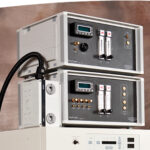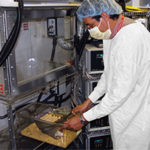 Cytocentric Visionaries: Jan Jensen, Trailhead BioSystems
Cytocentric Visionaries: Jan Jensen, Trailhead BioSystems
Part Three: Full-time Oxygen Control and Aseptic Conditions are Critical for Automated Protocol Optimization
In Part Two, we discussed Trailhead’s unbiased system of cell signaling optimization for differentiation. Today, Dr. Jan Jensen. CSO of Trailhead BioSystems discusses full-time optimization of cell culture conditions with us. Read part three below to learn how automated lab systems can assist with GLP compliance.
AH: How important is physiologically relevant oxygen for your system?
JJ: Oxygen is one condition for stem cells that is very critical. Whether stem cells are in the intestine or they sit as an inner cell mass in a deeply embedded embryo inside the uterus, high levels of oxygen are not provided to them. Therefore oxygen tension directly impacts the stemness program.
We know that high oxygen will interfere with the best maintenance conditions. So it is a parameter that needs to be critically controlled for essentially all work in most of the stem cell areas. It is very difficult if you work in the air at ambient 20% oxygen when we take cells in and out of incubators and handle them with our hands.
We’ve been very pleased with being able to take that dangerous parameter out of our equations by working within the bio-isolator from BioSpherix. We have the ability to put our entire process in the system. That allows a worry free environment under controlled conditions that we honestly think is rather important.
We appreciate that we can state that the oxygen tension for our experiments has been maintained throughout the entire experimental procedure at the given level.
But gas control is only one of the benefits of being in an isolated environment. There are many situations when we would normally have to take the cells out to use instruments on them, and that would compromise the process. It is not only oxygen that’s essential, but the aseptic and continuously controlled and monitored environment that we’re able to maintain.
Being able to have instruments in controlled conditions, knowing that we risk nothing, essentially, in possible contamination, increases our experimental success rate and directly impacts the quality of the results.
AH: So you think you’ve had an improvement in your success rate because of maintenance of constant conditions?
JJ: That’s a given.
When larger pieces of equipment are used, they’re typically not shielded from the ambient environment. As these processes move into full GLP compliance, process control through the process analytical technology that BioSpherix’s system offers, becomes more and more critical. It is quite challenging to take manual processes that are in the room air environment and convert them into fully GLP compliant processes.
We decided that we are going to take the entire process and put it in an isolated environment so we would be able to track parameters, and this is a highly beneficial position. We argue that it is critical to do this. The modular design and the flexibility by the BioSpherix units are unique. We think your system is quite helpful to that end.
AH: There’s a big interest right now for better in vitro reproducibility. Do you see more automated systems making their way into the basic research laboratory?
JJ: That is already happening. We see these complicated processes simply taken over by automation. There are some limitations to what we do now. If, for instance, pluripotency cell culture could be performed by off-the-shelf robotics, it would probably address an unmet need there. Then it also becomes critical that the process be encapsulated in a controlled environment, to keep them aseptic.
AH: Anything else that you would like to tell our readers?
JJ: Again I would say that it’s not us that out-thinks the system, we simply let nature tell us where the conditions are and that is why it’s easy for us. The way to do that is simply to build a system that has the capacity for the dimensionality needed in the biology that we do. We named our system “X-Evo” amalgamating the name from your Biospherix X-Vivo suite, and our applied robotics. is a unique system in the world that enables us to perform systems developmental biology.
Your readers should know that it is not closed off for use by them! We built Trailhead Biosystems in a way so that we make this technology available to others. We think it is important to make this technology globally available, and we already operate with international customers, as we also consider how we can be present outside the U.S. providing our technology more broadly.
AH: Thank you, Dr. Jensen. We very much appreciate your time and your insight.
This concludes our interview series with Dr. Jan Jensen.
If you would like to be featured in our Cytocentric Visionary Series, contact us. We would love to hear about your work.
Recent Articles

Cytocentric Visionaries Hal Broxmeyer
Cytocentric Visionaries: Hal Broxmeyer November 27, 1944 ~ December 8, 2021 Hal Broxmeyer telling Randy Yerden about his latest findings in June 2016. The average height of the Cytocentric researcher has been reduced, now that we have lost a giant. Hal Broxmeyer died...

Cytocentric Visionaries: Dr. David Gozal, MD – Part Two
Cytocentric Visionaries: Dr. David Gozal, MD Part 2: COVID-19 Research, Prone Positioning, and Chronoadequacy Alicia Henn, PhD MBA, Chief Scientific Officer, BioSpherix David Gozal, MD, MBA, PhD (Hon) is the Marie M. and Harry L. Smith Endowed Chair and Chairperson of...

Cytocentric Visionaries: Dr. David Gozal, MD – Part One
Cytocentric Visionaries: Dr. David Gozal, MD Part 1: COVID-19, ACE2, and the Circadian Clock Alicia Henn, PhD MBA, Chief Scientific Officer, BioSpherix David Gozal, MD, MBA, PhD (Hon) is the Marie M. and Harry L. Smith Endowed Chair and Chairperson of the Department...
About The Author
Alicia D Henn, PhD, MBA
Chief Scientific Officer of BioSpherix, Ltd
Alicia Henn has been the Chief Scientific Officer of BioSpherix, Ltd since 2013. Previously, she was a researcher at the Center for Biodefense Immune Modeling in Rochester, NY. Alicia obtained her PhD in molecular pharmacology and cancer therapeutics from Roswell Park Cancer Institute in Buffalo, NY and her MBA from the Simon School at University of Rochester in Rochester, NY.
If you would like to be featured in our Cytocentric Visionary Series, contact us. We would love to hear about your work.





































